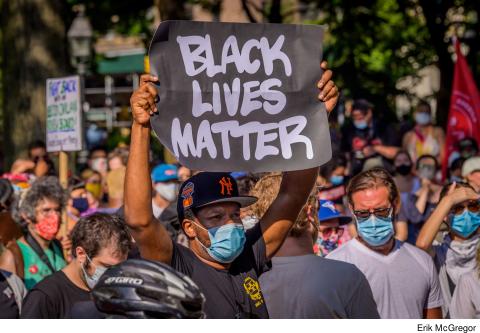Black lives matter
 |
Knowledge workers at their best ask questions, seek answers to those questions, apply those answers to the problems of the world and publicize their conclusions. Legally sanctioned violence against people of color has been constant since this country’s founding. What information will allow us to use this rare moment to take action furthering the end of police violence? This period poses lots of questions, and it’s up to us to come up with answers.
What will community law enforcement look like if we defund and de-weaponize the police? Over recent decades communities have seen police forces grow larger and become highly militarized, armed with high-tech military equipment from the US Army. Why is this happening when data shows that crime in the United States is on a sustained downtrend? To what extent is the growth of militarized police forces connected to the ever-growing race and class economic disparity in the US? Activists argue that the more recent reforms put in place after the killing of Michael Brown have demonstrably failed and that it is now time for more radical solutions such as defunding and de-weaponizing law enforcement, and transferring such savings to better community purpose. What strategic steps must we take in those circumstances where such proposals will need the approval of regressive state legislatures?
IMPLICIT BIAS
What are the best screening mechanisms to flag violent and racist tendencies in potential law enforcement personnel so that they can be denied such positions? Implicit bias tests are administered in many police forces, including Minneapolis, but this happens most frequently after police are on the force. Would similar tests be an effective screening tool to prevent officers from joining the force? Do hiring checks of police officers screen and eliminate officers because of domestic violence histories? Who approves the content of police training programs and is there local community involvement in the vetting process?
Moreover, why are there so many repeat offenders? Derek Chauvin, we now know, had a spotty record even before George Floyd’s death. Something fundamental is awry in the selection, training and disciplining of police forces. The role of the police unions in these practices warrants serious scholarly investigation.
Does diversifying police forces prevent these incidents? This idea needs study not just at the street officer level, but, more importantly, at the command level. Which cities have minorities and women at the top command level of their forces, and has this had any influence on how the street officers behave? Closely connected to this inquiry are reports of police officers having affiliations with white supremacists and neo-Nazi-aligned organizations. Governments at all levels have a compelling state interest in removing officers who belong to hate groups. Membership in such organizations conflicts with police obligations to enforce the constitution and its requirements of equal protection, due process, the right to vote and freedom from the badges and incidents of slavery.
Police forces must be barred from infiltrating protest movements and serving as provocateurs, committing crimes for the purpose of turning public sentiment against the goals of peaceful protests, providing justifications for curfews and further police violence. Not only is there extensive evidence of such activity from the ’60s, with the infamous COINTELPRO work against the Black Panthers and other groups, but there is contemporary evidence that police-instigated violence is happening today, including possibly the attack on the CNN building in Atlanta. The white supremacist doctrine of “acceleration” explicitly calls for civil disorder to increase racial polarization in order to undermine social progress, and Donald Trump appears to be a fervent believer in this. These tendencies merit further study because there is absolutely no legal or policy justification for governments to engage in criminal activity.
Community organizations have worked for decades to stop police violence, including the recent city council vote in Minneapolis to “eliminate” the police department. What has worked and what has not? Why do California cities, like Richmond, have fewer police deaths than nearby Oakland and San Pablo? Why is there not a federal data bank collecting incidents of police violence nationwide?
CHANGING LEGAL DOCTRINES
There are numerous legal doctrines protecting police officers and police departments that need to be scrapped. The doctrine of qualified immunity often protects officers who engage in the most brutal of assaults, simply because the facts of the specific assaults have never before been specifically deemed unlawful by a federal court. Municipal immunity doctrine protects local governments from liability for police violence if the culprit is the so-called “bad apple” who acted beyond official government policy. The imposition of municipal liability even in “bad apple” cases would force cities to take seriously their obligation not to hire such persons in the first place and to make sure they provide adequate training for those who manage to get through screening.
These are just some of the areas where effective scholarly work, combined with rigorous activism, will contribute to ending the problem of police violence.
Frank Deale is a professor at the CUNY School of Law. Deale has served as the legal director of the Center for Constitutional Rights.
Editor’s note: The PSC is working with other anti-racist organizations and Black Lives Matter. The union has formed its own Anti-Racism Committee.

